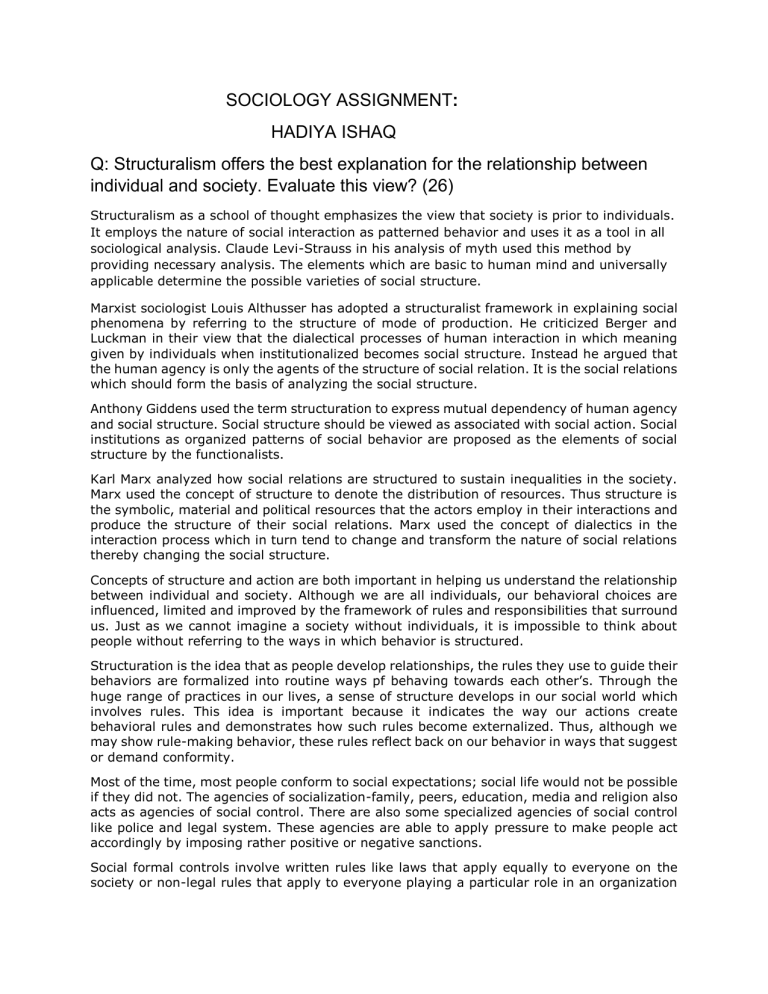
SOCIOLOGY ASSIGNMENT: HADIYA ISHAQ Q: Structuralism offers the best explanation for the relationship between individual and society. Evaluate this view? (26) Structuralism as a school of thought emphasizes the view that society is prior to individuals. It employs the nature of social interaction as patterned behavior and uses it as a tool in all sociological analysis. Claude Levi-Strauss in his analysis of myth used this method by providing necessary analysis. The elements which are basic to human mind and universally applicable determine the possible varieties of social structure. Marxist sociologist Louis Althusser has adopted a structuralist framework in explaining social phenomena by referring to the structure of mode of production. He criticized Berger and Luckman in their view that the dialectical processes of human interaction in which meaning given by individuals when institutionalized becomes social structure. Instead he argued that the human agency is only the agents of the structure of social relation. It is the social relations which should form the basis of analyzing the social structure. Anthony Giddens used the term structuration to express mutual dependency of human agency and social structure. Social structure should be viewed as associated with social action. Social institutions as organized patterns of social behavior are proposed as the elements of social structure by the functionalists. Karl Marx analyzed how social relations are structured to sustain inequalities in the society. Marx used the concept of structure to denote the distribution of resources. Thus structure is the symbolic, material and political resources that the actors employ in their interactions and produce the structure of their social relations. Marx used the concept of dialectics in the interaction process which in turn tend to change and transform the nature of social relations thereby changing the social structure. Concepts of structure and action are both important in helping us understand the relationship between individual and society. Although we are all individuals, our behavioral choices are influenced, limited and improved by the framework of rules and responsibilities that surround us. Just as we cannot imagine a society without individuals, it is impossible to think about people without referring to the ways in which behavior is structured. Structuration is the idea that as people develop relationships, the rules they use to guide their behaviors are formalized into routine ways pf behaving towards each other’s. Through the huge range of practices in our lives, a sense of structure develops in our social world which involves rules. This idea is important because it indicates the way our actions create behavioral rules and demonstrates how such rules become externalized. Thus, although we may show rule-making behavior, these rules reflect back on our behavior in ways that suggest or demand conformity. Most of the time, most people conform to social expectations; social life would not be possible if they did not. The agencies of socialization-family, peers, education, media and religion also acts as agencies of social control. There are also some specialized agencies of social control like police and legal system. These agencies are able to apply pressure to make people act accordingly by imposing rather positive or negative sanctions. Social formal controls involve written rules like laws that apply equally to everyone on the society or non-legal rules that apply to everyone playing a particular role in an organization like school or company. Sanctions are enforced by these agencies of socialization. Formal controls tell everyone within a group exactly what behaviors are acceptable and what not. However, breaking these rules may result in formal sanction such as punishment or imprisonment. Informal controls reward or punish both acceptable and unacceptable behaviors in everyday settings, like family. These controls do not normally involve rules or procedures rather they operate through informal enforcement mechanisms that include sarcasm, ridicule, disapproving looks or personal violence. Belonging to a group and wanting to continue to belong to it with the approval of other group members is itself strong form of social pressure. Ostracism is the exclusion of someone from a grp, a very strong negative sanction that is a strong reason to conform to the groups. Another factor which influences people to conform most of the time is self-interest. In order to live as a member of society, it is necessary to get on with others. We all need to cooperate with others and know that other people are less likely to support those who act in ways they disapprove of. Individuals therefore conform because they can see it in their own benefits to do so. This can be extended to the idea of social exchange. This is the view that people give to others because this creates a relationship with joint obligations so that the giver is less likely to receive in return. When individuals are choosing a course of action, they weigh up the likely consequences and so are likely to choose one which will result in a benefit to themselves. This means that they are likely to conform to social expectations and to follow the socially approved norms and values. In the conclusion, structuralism offers the best explanation for the relationship between individual and society. It thus appears there is a continuous relationship between social structures and human agency because they tend to be reciprocal and interactive.... In this perspective, it can be said that analytical focus ought to be made on the mutuality of procedures relative to human interactions and social development.



